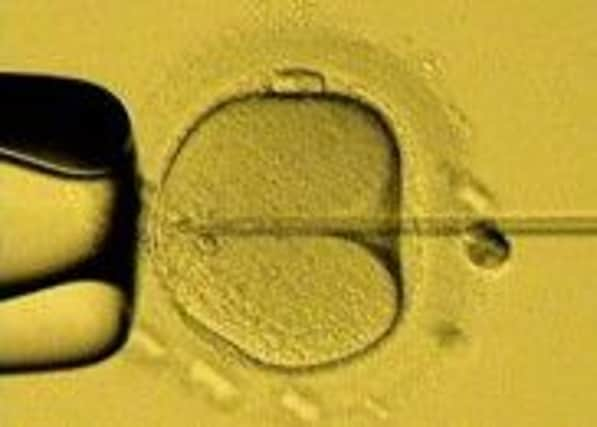IVF gender selection ban ‘has no ethical basis’


A team of Britain’s leading ethicists said it would be ethical to allow people to use fertility techniques to choose whether they have a boy or a girl.
There is anecdotal evidence that some couples are opting to go abroad for treatment which involves screening embryos to determine the sex before they are implanted using normal IVF techniques.
Advertisement
Hide AdAdvertisement
Hide AdBut the ethicists, from Keele University in Staffordshire, said this posed risks to the patients and any child born as result.
The publication – Eugenics and the Ethics of Selective Reproduction – comes ahead of a conference of fertility specialists from across Europe meeting in London this weekend.
At present in the UK, sex- selection techniques are only permitted for medical reasons, for example to help at-risk couples avoid having a child with a genetic disorder linked to one sex or the other. But some have called for the techniques to be used by those with a preference for a boy or a girl.
The ethicists said they did not believe that allowing this would lead to a population imbalance if allowed within a strong regulatory framework.
They said other requests may stem from sexism or gender stereotyping, but these attitudes in themselves did not pose such risks to children that sex selection should be prohibited.
The authors concluded that in the UK it would not be right for “social” sex-selection treatments to be funded by the taxpayer.
The ban on sex selection is not only based on ethical concerns but also the risks posed by both fertility treatment to the women and potential damage to embryos during the sex-selection screening. The ethicists said that proper regulation would be needed to minimise any harmful effects of treatments carried out for non-medical reasons.
Lead author Professor Stephen Wilkinson, professor of bioethics at Lancaster University and previously based at Keele, said: “We examined the ethics of gender preference and sex- selection techniques in the British context and found no reason to expect harm to future children or wider society if these techniques were made available for ‘social’ reasons within our regulated fertility treatment sector.
Advertisement
Hide AdAdvertisement
Hide Ad“People who would prefer their new baby to be of a particular sex often have their own very personal reasons for this, to do with their family’s particular circumstances or history.
“We didn’t find any ethical arguments sufficient to justify a blanket ban on these people seeking sex selection.”
Dr Calum MacKellar, director of research at the Scottish Council on Human Bioethics, said he had concerns about allowing sex selection for social reasons: “The difference between two children is a genetic difference. So what you are saying is we want certain types of children with certain types of genes and we don’t want other children with other genes. This is the beginning of eugenics, when a parent, community or society decide to only make sure that certain types of people are born.”
• CARE of expectant mothers could be revolutionised after British doctors discovered a gene which can lead to post-natal depression and an early test that can detect a woman’s likelihood of suffering from the illness.
A simple blood test, which is thought would cost around £10, carried out before babies are born could identify and even prevent the condition in mothers who have the genetic variation.
A team at University Hospitals Coventry & Warwickshire NHS Trust (UHCW) and Warwick Medical School uncovered evidence of a predisposition to post-natal depression (PND) due to variants in genes of the hypothalamo-pituitary-adrenal (HPA) axis – traditionally seen as the body’s “stress system”.
Professor Dimitris Grammatopoulos, professor of molecular medicine and consultant in clinical biochemistry and molecular diagnostics at UHCW and Warwick Medical School, who led the research, said: “PND is a complex condition influenced by everything from a woman’s financial situation to the level of support she is given.
“However, our research shows there is more to the ‘baby blues’ than environmental factors alone and has a strong genetic component.
Advertisement
Hide AdAdvertisement
Hide Ad“This discovery has the potential to revolutionise our care for expectant mothers by screening them before the devastating symptoms of PND set in.”
His paper, which has been published by the Journal of Psychiatric Research, was based on his recent study of 200 pregnant women.